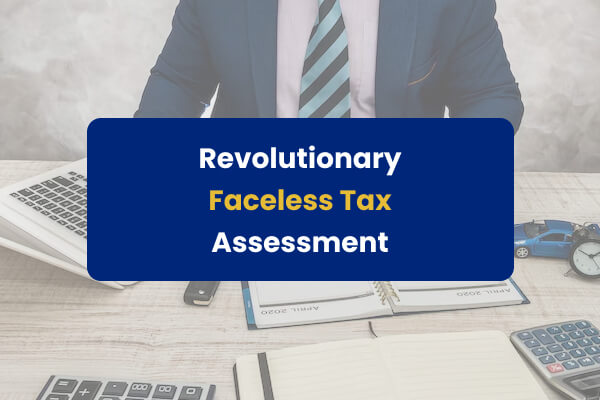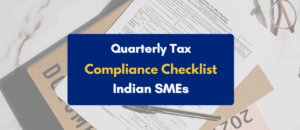Written By – PKC Desk, Edited By – Saraswathi, Reviewed By – Sanjana
Revolutionary Faceless Tax Assessment – what it means to your business?
Over the last one year the government has introduced major reforms in income tax such as:
- Launching of new income tax portal for providing seamless processing of returns and faster refunds.
- New ‘optional’ tax regime by slashing income tax rates where income tax deductions and exemptions were removed in order to simplify the tax system.
- Integration of Income tax with GST, Form 26AS will automatically reflect Turnover as per GSTR-3B Return, reducing the effects of manipulation of accounts.
- AIS is a comprehensive statement of all the financial transactions of the taxpayer provided by various entities based on his/her PAN details in a particular year.
- Pre-filled ITR 2 and ITR-3 returns with information relating to taxpayer, employer and break up of salary through from FORM 16.
As part of these reforms, government announced Faceless income tax assessment which is revolutionary . Let’s discuss.
What is faceless Income tax assessment?
Faceless assessment is a dynamic measure towards digitalization of tax compliances for efficient and effective tax administration, greater transparency, ease of meeting tax compliances and minimizing physical interface. The previous arrangement of scrutiny proceedings involves the taxpayers to submit the responses for notices and other grievances to the Income department physically. With the implementation of newly introduced mechanism of faceless assessment, the physical interaction between the Officials and the tax payer is removed and sets out the mechanism to carry out the assessment electronically.
How does faceless assessment work?
The Intimations, notices, orders will be issued by the National e-Assessment Center through the E-Filing portal. The tax payers need to submit their responses along with submissions electronically within the stipulated time. This paperless trail is a big relief to the tax payers as it saves considerable time and resources thus enabling faster and efficient completion of assessment.
- Responses are submitted electronically.
- Draft assessment order in one city, review in another city and finalized in third city.
- Adverse draft assessment order is provided to the taxpayer for response before finalization of the assessment order.
- Seeks to provide faster processing of refunds.
- Aims to provide faster completion of assessments in a systematic and time bound manner.
Impact of Faceless assessment to your business?
01 Strict timelines – Since the user interface has been eliminated the time limit provided for responding to the notices have become relatively more stringent thus creating the importance of choosing the right auditor for your business for ensuring proper compliances. Since non-responsive to notices leads to heavy fines, indirect losses and damage to the reputation of the organization.
02 Infrastructure – Tax payers with lack of resources or properly equipped system will face a problem since the submission are to be uploaded online.
03 Enhanced Internal norms – Creation of different level of units by the Income tax department for efficiency in the assessment process in turn increases the accountability of the taxpayers to adhere to income tax compliances on time such as GST, TDS etc.
04 Books of accounts – Creation of robust system of maintaining documentations and records is vital for dealing with future assessments. Proper recording of transactions, reconciliation and supporting documents to be formalized and kept ready in case of requirement of production of such documents to the Income tax department.
05 Record keeping – Books and records are required to be maintained for a longer period of time. The department can even open a case of 10 years if the tax liability is more than INR 50 Lakh.
What should be the role of auditor in this new age of faceless tax?
01 Error free – There should be 3-tier verification mechanism to mitigate the risks of any notices.
02 Dynamic – Developments in income tax laws in the recent years have increased the responsibility of the auditor to quickly adapt to the changes.
03 Tech friendly – In the era of rapid technological advancements the auditors are required to be equipped with necessary software to meet the needs of the client.
04 Timely responses – Provides timely retrieval and collation of information and documents with efficient to the point explanations to the notices from the Income tax department which is vital for smooth closure of assessments and avoiding complications leading to further litigation.
05 Documentation – Developing proper documentation procedures and maintenance of records for addressing the questions and issues raised by the department.
06 On going support for compliances – Providing regular updates on compliances relevant to your business.
07 Scrutiny safeguard – Assist you to conclude your tax scrutiny and appeal with the least amount of risk possible.
08 Income tax planning – Provide expert opinions and deep analyzing of all tax implications and thereby reducing your tax liability.
What is current status of implementation?
- The new portal is still facing technical glitches since launched with problems resurfacing which needs to be resolved.
- No proper guidelines on queries relating to TDS mismatch to CPC. The demand in the portal remains unresolved for a long period of time.
- Absence of proper channel in relation to condonation queries due to unavailability of submission option in online portal.
- Sometimes the facts involved in a particular case are so complex which requires a physical hearing to put forth certain points to the AO for faster completion of matters.
- Outstanding tax demand status for a client has not been updated even after receiving demand intimation on this behalf.
- Restrictions in the size and number of the files that can be uploaded in e-filing portal.
Future of Faceless System
While there maybe initial problems in the faceless assessment regime, it is indeed a major direct tax reform which would pave the way for greater transparency in litigation and compliance matters. We expect technical glitches to be resolved in next 1-2 years and more clarity will be given on handling issues with current faceless system.
Moreover, we believe faceless system will extend to other areas of statutory compliances in next 5 years. There could be a possibility of even bringing GST & customs compliances under faceless system.
The scheme has of now excludes among others
>assessments by international taxation jurisdiction,
>assessment of search cases,
> Tax deducted at source (TDS)-related matters
> Condonation procedures
Which will become faceless in the near future.
It brings up forth an eminent need for companies to be prepared for
- On time compliances
- Monthly closure of books
- GST e-invoicing for all businesses irrespective of turnover
- Accurate Financial records & documents filing
- Reducing dependency on cash transactions
- Having an internal Auditor for business to monitor compliances and provide professional advice on key matters.
Author

Sanjana C
I am an expertise in Chartered Accountant with a focus on taxation. Also mastered the intricacies of global tax laws and enjoys studying foreign languages in spare time.

 Expert verified
Expert verified 

